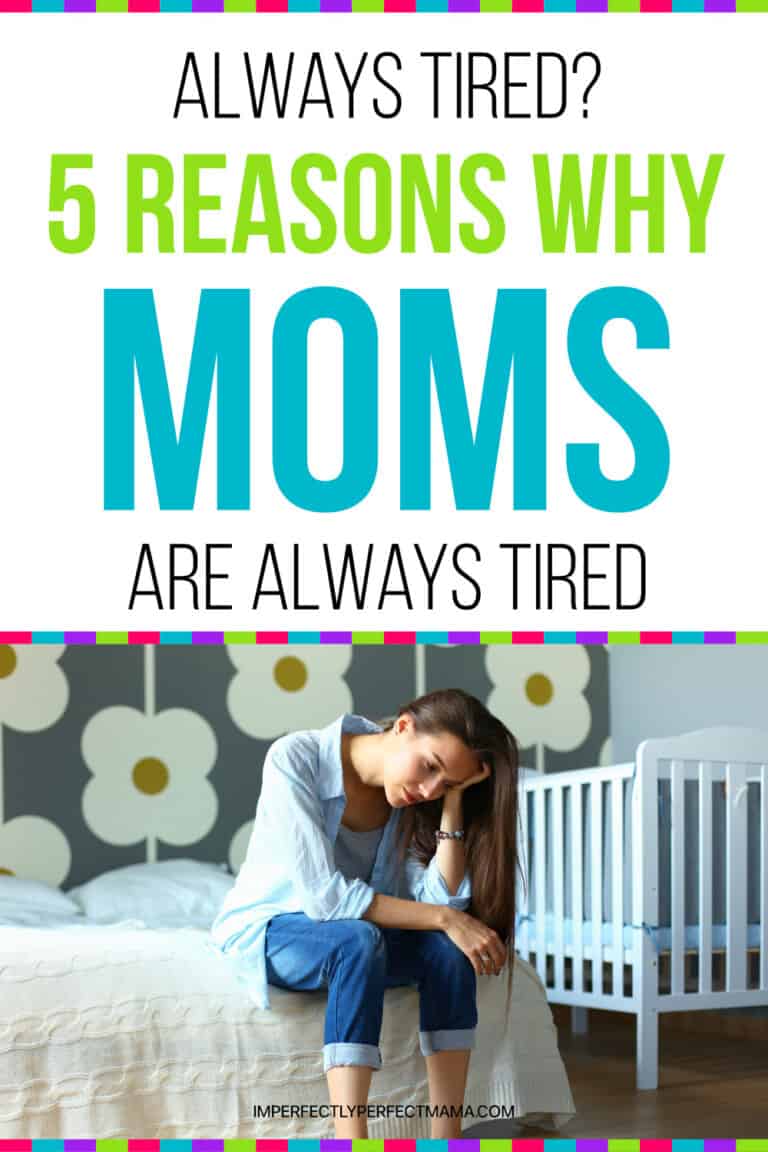You’re getting eight hours of sleep a night.

You’ve carved in some extra time for rest and relaxation into your daily routine.
You’re exercising regularly, taking your daily multivitamin, and making healthier diet choices.
But you’re still. So. Tired.
Even drinking that third cup of coffee isn’t touching you.
And you wake up feeling unrested and crankier than ever.
Unfortunately, fatigue and exhaustion in motherhood are not exclusive to the sleep deprived days of raising tiny infants.
Women in all stages of motherhood are experiencing excessive tiredness at alarmingly high rates.
According to a survey from earlier in 2023, 49% of moms reported feeling burnt out by motherhood.
The constant exhaustion that comes with motherhood can negatively impact our relationships, quality of life and our overall wellbeing.
It is hard to feel good about ourselves when we are running on empty. It is hard keeping up with the demands of parenting when we are unable to keep up with tasks, chores and responsibilities.
And it’s even harder finding the energy to go out with our friends when we finally have the time.
And there are many reasons why we are experiencing so much of it, despite getting the right amount of sleep.
Here are 4 reasons in particular that you may want to pay attention to if exhaustion is weighing heavily on your quality of life:
1. Nutrient Deficiency

Women are prone to nutrient deficiency during pregnancy, after giving birth and beyond.
We all know to take our prenatal vitamins while we are busy growing a tiny human, but what happens to our nutritional needs after that tiny human comes out into the world?
This study discusses how moms experience iron-deficiency anemia due to postpartum blood loss.
And for moms who are past the postpartum phase, getting a period every month doesn’t help our iron levels either. Iron helps us build muscle and gain energy.
Without enough of it, we tend to feel weak and fatigued.
Incorporating more leafy greens and red meat into our diet can help us obtain more iron.
Vitamin B12 – another substance responsible for muscle building, strength and energy production – also has a tendency to be low in women.
This study in particular shows that women of childbearing age are prone to B12 deficiency.
Being low in B12, like iron, can cause feelings of weakness, fatigue and poor concentration.
Dietary changes and supplementation can help boost B12 levels.
Another nutrient that moms need to consider getting more of is protein.
Protein is a building block that contributes to muscle repair.
As moms, we are always on the move and using our muscles.
If we don’t get enough of it, we might feel more tired. Supplementing with protein shakes or adding more lean meat to our diet might be a good idea if we are feeling more weak and tired.
Ask your doctor if you’re concerned about having nutrient deficiencies.
Lab work maybe required to detect any abnormalities and can lead to supplementation options.
2. Hormonal Changes
We can thank hormones – those elusive chemical messengers – for fluctuating and causing a commotion in our bodies.
Changes to hormones after childbirth can wreak havoc on our emotions and our energy levels.
The hormone, progesterone, drops after giving birth.
According to this article, the decrease in progesterone could contribute to postpartum depression (PPD)
Depression and “the baby blues” can cause us to feel less motivated and more lethargic.
It is important to seek support if you or your loved one are concerned about PPD.
Breastfeeding involves hormone prolactin and oxytocin, which also contribute to fatigue.
Oxytocin is released in the body during breastfeeding and helps to stimulate uterine contraction after birth, which prevents excessive postpartum bleeding.
It is also known as the “bonding hormone”, which can cause those warm and fuzzy feelings of attachment between the mom and baby.
But since it does cause relaxing feelings, it can also induce sleepiness.
So if you feel like taking a nap after breastfeeding, oxytocin maybe the reason.
Prolactin is the hormone responsible for milk production.
According to this study, higher levels of prolactin may contribute to breastfeeding mothers feeling more sleepy during the day.
Perimenopause and menopause are also other stages of our lives when we experience fluctuating hormone levels, specifically progesterone and estrogen.
During this transitional period, the levels of these hormones in women’s bodies can cause fatigue, mood changes, “hot flashes” and cessation of menstruation.
Check in with your medical provider if you are concern about your hormones.
There are treatment options available to those who may need it.
3. Workload Demand

Being a mom is not just a full-time job – it’s a 24/7 job.
Whether you stay at home or go to work, the demands of raising little ones never stops.
And women have a tendency to take on multiple roles without asking for help from family and friends.
Without any time for breaks most days and little time for rest, it’s no wonder most of us are tired all the time.
According to this report, women are more likely to suffer from “invisible labor.”
Women are more likely than their husbands to assume responsibilities in the household, including coordination of kids’ activities, appointments, and household chores.
The mental and emotional load of responsibilities can come with a cost and really wear down our energy levels over time.
If you feel that you are taking on too much, it might be time to discuss roles and responsibilities with your partner.
Be honest about how much work you are capable of doing and ask your partner, family or friends to pitch in help.
Maybe your partner can do the grocery run on Wednesdays so that you don’t have to.
Or maybe the grandparents can pick up the kids every Friday, allowing you a couple of extra hours to get some downtime.
It’s hard to ask for help but a little bit of support here and there can really go a long way.
4. Chronic Stress
The World Health Organization (WHO) defines stress “as a state of worry or mental tension caused by a difficult situation.” Stress overtime can have negative results on our energy levels.
From paying close attention to our toddlers at the playground to having to constantly be on time for activities and dealing with traffic, it seems that moms are always on high alert.
Not to mention, there is plenty of stress at home, at work and within our relationships.
According to this research, mothers are more likely to worry and stress about their children than fathers are.
This information shows that mothers carry a lot of the emotional weight in relationships when it comes to raising children.
Further more, this study shows the correlation between stress and fatigue.
Data reflects that people who have higher levels of stress tend to have higher levels of fatigue.
Not to mention, stress also contributes to higher incidences of health problems.
With these findings in mind, its evident that mothers with a lot of stress tend to feel more tired.
If you think that stress is effecting your health, you may want to consider taking more time for yourself and incorporating more self-care into your daily routine.
5. Other Underlying Health Issues

As explained previously, it’s really important to talk to a healthcare professional if your exhaustion has become a concern and is interfering with your daily life.
Problems such as thyroid dysfunction, diabetes and heart disease can all cause fatigue.
Hypothyroidism is a condition in which the thyroid is not producing enough hormones, causing symptoms of weight gain and low energy levels.
Diabetes is a disease that causes high blood sugar levels and not enough insulin hormone to regulate those levels – fluctuations in blood sugar can cause fatigue and weakness over time.
And heart disease is a serious illness in which the heart no longer functions or contracts effectively, causing shortness of breath and fatigue.
It is important to seek medical evaluation if these issues run in your family or if your exhaustion is not remedied with adequate rest and nutrition.
So as you can see, lack of sleep is not the only reason why you might be tired all the time. As explained before, please check with your doctor to make sure that there’s nothing medically serious going on. Exhaustion and burnout should not be ignored, and there are options and solutions to help you.




Leave a Reply